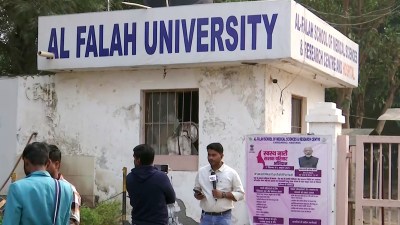The Supreme Court Tuesday asked High Courts across the country to collect data on pending trials in child trafficking cases and ensure their completion within six months.
Cancelling the bail granted to the accused in three inter-state child trafficking cases, a bench of Justices J B Pardiwala and R Mahadevan said that if need be, day to day trials should be conducted to achieve this.

“We direct all the High Courts across the country to call for the necessary information as regards the status of the pending trials relating to child trafficking. Once each of the High Courts is able to collect the necessary data as regards the status of the trials, a circular thereafter shall be issued on its administrative side to all the concerned trial courts to complete the trials within a period of six months from the date of the circular and if need be, by conducting the trials on day-to-day basis,” the bench said in its order and asked the High Courts to thereafter forward a compliance report to it.
Story continues below this ad
The top court also asked state governments to study and implement the recommendations of the NHRC-commissioned 2023 study by Bharatiya Institute of Research and Development (BIRD), New Delhi, on human trafficking and ways to combat it.
The court pointed out that as per NCRB Data, about 3.80 lakh persons were traced missing and out of them, about two-third were females.
The SC also directed that “if any newborn infant is trafficked from any hospital, the immediate action against the hospital should be suspension of licence to run the hospital over and above other actions in accordance with law. When any lady comes to deliver her baby in any hospital, it is the responsibility of the administration of the hospital to protect the newborn infant in all respects.”
Cancelling the bail given to the accused, the top court expressed displeasure over the HC giving them relief saying it dealt with the bail pleas in a “very callous matter.” It also criticised the UP government for its handling of the matter.
Story continues below this ad
“Considering the serious nature of the crime and the modus operandi adopted by the accused persons we are of the view that the High Court should not have exercised its discretion in favour of the accused persons. We are sorry to say but the High Court dealt with all the bail applications in a very callous manner. The outcome of this callous approach on the part of the High Court has ultimately paved the way for many accused to abscond and thereby put the trial in jeopardy. These accused persons are a big threat to the society wherever they are in the country. They have exhibited a tendency of committing a particular nature of crime, namely, child trafficking,” the SC said.
It added that “the least that was expected of the High Court while granting bail to all the accused persons was to impose a condition on each of them to mark their presence once in a week at the concerned police station so that the police can keep a check over the movements of all the accused persons. All that the High Court did was to direct the accused persons to remain present before the trial court. In none of the impugned orders there is a condition of marking presence at the concerned police station as a result, the police lost track of all these accused persons.”
On the role of the state in the case, the bench said, “We are thoroughly disappointed with the manner in which the State handled the situation. Why did the State not do anything for all this period of time? Why did the State not deem fit to challenge the orders of bail passed by the High Court? The State unfortunately has exhibited no seriousness worth the name.”
The court said, “We are absolutely conscious that liberty of a person should not be lightly dealt with, for deprivation of liberty of a person has an immense impact on the mind of a person.” It added, “however, in a democratic body polity, which is wedded to the rule of law an individual is expected to grow within the social restrictions sanctioned by law. The individual liberty is restricted by larger social interests and its deprivation must have due sanction of law.”
Story continues below this ad
Making it clear that “concept of liberty is not in the realm of absolutism but is a restricted one,” the bench said that “the cry of the collective for justice, its desire for peace and harmony and its necessity for security cannot be allowed to be trivialised. The life of an individual living in a society governed by the rule of law has to be regulated and such regulations which are the source in law subserve the social balance and function as a significant instrument for protection of human rights and security of the collective. This is because, fundamentally, laws are made for their obedience so that every member of the society lives peacefully in a society to achieve his individual as well as social interest.”









